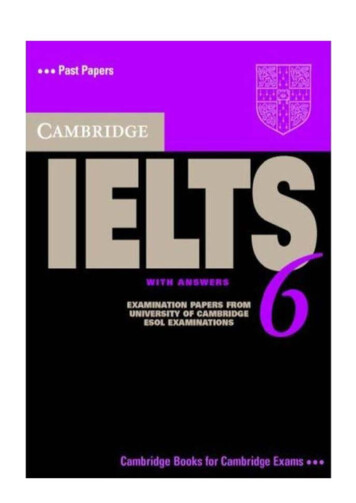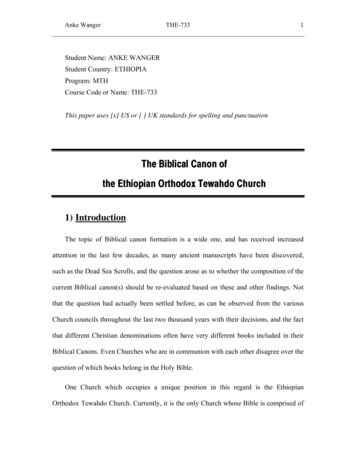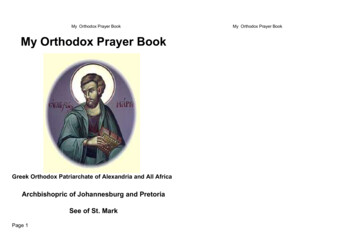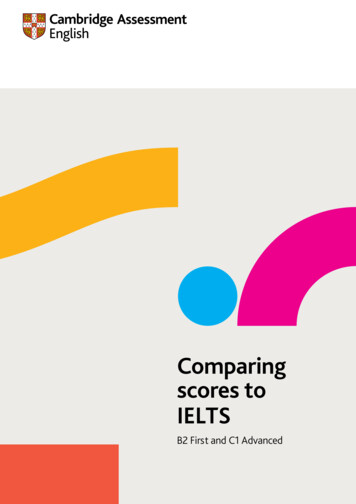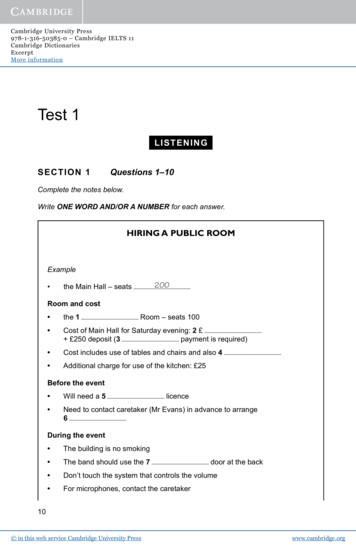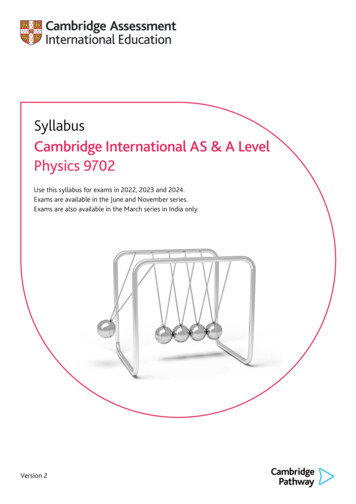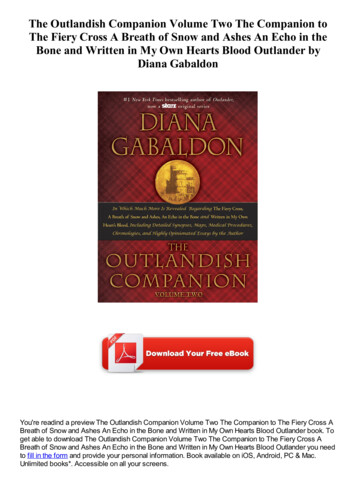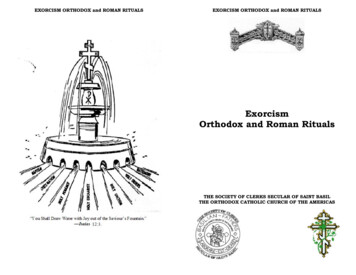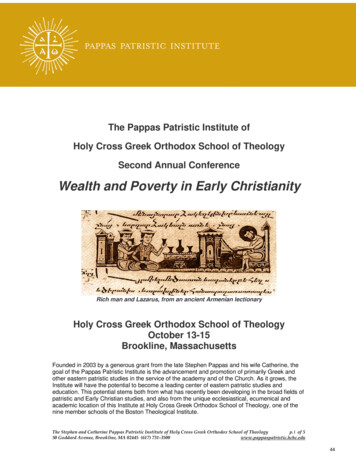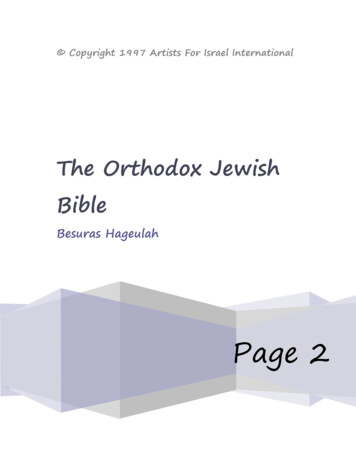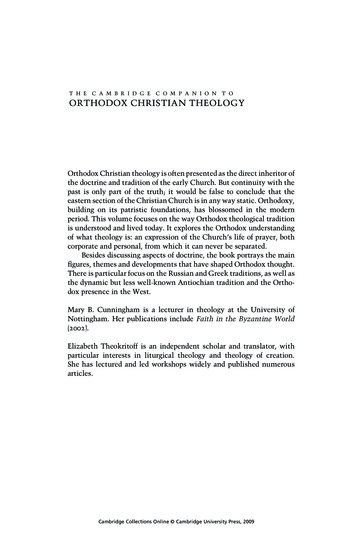
Transcription
Armenian Church Library http://hygradaran.weebly.comT H EC A M B R I D G EC O M P A N I O NT OORTHODOX CHRISTIAN THEOLOGYOrthodox Christian theology is often presented as the direct inheritor ofthe doctrine and tradition of the early Church. But continuity with thepast is only part of the truth; it would be false to conclude that theeastern section of the Christian Church is in any way static. Orthodoxy,building on its patristic foundations, has blossomed in the modernperiod. This volume focuses on the way Orthodox theological traditionis understood and lived today. It explores the Orthodox understandingof what theology is: an expression of the Church’s life of prayer, bothcorporate and personal, from which it can never be separated.Besides discussing aspects of doctrine, the book portrays the mainfigures, themes and developments that have shaped Orthodox thought.There is particular focus on the Russian and Greek traditions, as well asthe dynamic but less well-known Antiochian tradition and the Orthodox presence in the West.Mary B. Cunningham is a lecturer in theology at the University ofNottingham. Her publications include Faith in the Byzantine World( ).Elizabeth Theokritoff is an independent scholar and translator, withparticular interests in liturgical theology and theology of creation.She has lectured and led workshops widely and published numerousarticles.Cambridge Collections Online Cambridge University Press, 2009
Armenian Church Library http://hygradaran.weebly.comCambridge Collections Online Cambridge University Press, 2009
CAMBRIDGE COMPANIONS TO RELIGIONA series of companions to major topics and key figures in theology andreligious studies. Each volume contains specially commissioned chapters byinternational scholars which provide an accessible and stimulating introductionto the subject for new readers and non-specialists.Other titles in the seriesTHE CAMBRIDGE COMPANION TO CHRISTIAN DOCTRINEedited by Colin Gunton ( )I S B N hardbackISBN X paperbackTHE CAMBRIDGE COMPANION TO BIBLICAL INTERPRETATIONedited by John Barton ( )I S B N hardbackISBN paperbackTHE CAMBRIDGE COMPANION TO DIETRICH BONHOEFFERedited by John de Gruchy ( )I S B N X hardbackISBN paperbackTHE CAMBRIDGE COMPANION TO KARL BARTHedited by John Webster ( )I S B N hardbackISBN paperbackTHE CAMBRIDGE COMPANION TO CHRISTIAN ETHICSedited by Robin Gill ( )I S B N X hardbackISBN paperbackTHE CAMBRIDGE COMPANION TO JESUSedited by Markus Bockmuehl ( )I S B N hardbackI S B N paperbackTHE CAMBRIDGE COMPANION TO FEMINIST THEOLOGYedited by Susan Frank Parsons ( )I S B N X hardbackI S B N paperbackTHE CAMBRIDGE COMPANION TO MARTIN LUTHERedited by Donald K. McKim ( )I S B N hardbackISBN paperbackTHE CAMBRIDGE COMPANION TO ST PAULedited by James D. G. Dunn ( )I S B N hardbackISBN paperbackTHE CAMBRIDGE COMPANION TO POSTMODERN THEOLOGYedited by Kevin J. Vanhoozer ( )I S B N X hardbackI S B N paperbackTHE CAMBRIDGE COMPANION TO JOHN CALVINedited by Donald K. McKim ( )I S B N hardbackISBN X paperbackTHE CAMBRIDGE COMPANION TO HANS URS VON BALTHASARedited by Edward T. Oakes, SJ and David Moss ( )I S B N hardbackI S B N paperbackTHE CAMBRIDGE COMPANION TO REFORMATION THEOLOGYedited by David Bagchi and David Steinmetz ( )I S B N hardbackI S B N paperbackContinuedCambridge Collections Online Cambridge University Press, 2009
THE CAMBRIDGE COMPANION TO AMERICAN JUDAISMedited by Dana Evan Kaplan ( )I S B N hardbackISBN paperbackTHE CAMBRIDGE COMPANION TO KARL RAHNERedited by Declan Marmion and Mary E. Hines ( )I S B N hardbackI S B N paperbackTHE CAMBRIDGE COMPANION TO FRIEDRICH SCHLEIERMACHERedited by Jacqueline Mariña ( )I S B N hardbackISBN X paperbackTHE CAMBRIDGE COMPANION TO THE GOSPELSedited by Stephen C. Barton ( )I S B N hardbackISBN paperbackTHE CAMBRIDGE COMPANION TO THE QUR ’ ANedited by Jane Dammen McAuliffe ( )I S B N hardbackI S B N X paperbackTHE CAMBRIDGE COMPANION TO JONATHAN EDWARDSedited by Stephen J. Stein ( )I S B N hardbackISBN paperbackTHE CAMBRIDGE COMPANION TO EVANGELICAL THEOLOGYedited by Timothy Larsen and Daniel J. Trier ( )I S B N hardbackI S B N paperbackCAMBRIDGE COMPANION TO MODERN JEWISH PHILOSOPHYedited by Michael L. Morgan and Peter Eli Gordon ( )I S B N hardbackI S B N paperbackTHE CAMBRIDGE COMPANION TO THE TALMUD AND RABBINIC LITERATUREedited by Charlotte E. Fonrobert and Martin S. Jaffee ( )I S B N hardbackI S B N paperbackTHE CAMBRIDGE COMPANION TO LIBERATION THEOLOGY , SECOND EDITIONedited by Christopher Rowland ( )I S B N hardbackI S B N paperbackTHE CAMBRIDGE COMPANION TO THE JESUITSedited by Thomas Worcester ( )I S B N hardbackISBN paperbackTHE CAMBRIDGE COMPANION TO CLASSICAL ISLAMIC THEOLOGYedited by Tim Winter ( )I S B N hardbackISBN paperbackTHE CAMBRIDGE COMPANION TO PURITANISMedited by John Coffey and Paul Lim ( )I S B N hardbackI S B N paperbackForthcomingTHE CAMBRIDGE COMPANION TO PAUL TILLICHedited by Russell Re ManningTHE CAMBRIDGE COMPANION TO THE VIRGIN MARYedited by Sarah BossTHE CAMBRIDGE COMPANION TO ANCIENT CHRISTIANITYedited by Rebecca LymanCambridge Collections Online Cambridge University Press, 2009
THE CAMBRIDGE COMPANION TOORTHODOX CHRISTIANTHEOLOGYEdited by Mary B. Cunningham andElizabeth TheokritoffCambridge Collections Online Cambridge University Press, 2009
CAMBRIDGE UNIVERSITY PRESSCambridge, New York, Melbourne, Madrid, Cape Town, Singapore, São Paulo, DelhiCambridge University PressThe Edinburgh Building, Cambridge CB RU, UKPublished in the United States of America by Cambridge University Press, New Yorkwww.cambridge.orgInformation on this title: www.cambridge.org/ # Cambridge University Press This publication is in copyright. Subject to statutory exceptionand to the provisions of relevant collective licensing agreements,no reproduction of any part may take place without the writtenpermission of Cambridge University Press.First published Printed in the United Kingdom at the University Press, CambridgeA catalogue record for this publication is available from the British LibraryISBNISBN - - - - hardback - - - - paperbackCambridge University Press has no responsibility for the persistence oraccuracy of URLs for external or third-party internet websites referred toin this book, and does not guarantee that any content on suchwebsites is, or will remain, accurate or appropriate.Cambridge Collections Online Cambridge University Press, 2009
This volume is dedicated to the memory of Nicolas andMilitza Zernov, without whose labours such a book mightnever have been commissioned – or would certainly havelooked very different.May their memory be eternal!Cambridge Collections Online Cambridge University Press, 2009
Cambridge Collections Online Cambridge University Press, 2009
ContentsNotes on contributors page xiPreface xvA chronology of the Eastern Churches xxiAbbreviations xxvMap xxviWho are the Orthodox Christians? A historicalintroduction MARY B. CUNNINGHAM AND ELIZABETH THEOKRITOFFPartIDoctrine and Tradition Scripture and tradition in the ChurchTHEODORE G. STYLIANOPOULOS Biblical interpretation in worship ARCHIMANDRITE EPHREM LASH God in Trinity BORIS BOBRINSKOY Creator and creation ELIZABETH THEOKRITOFF The human person as image and likeness of God NONNA VERNA HARRISON Christ and salvation PETER BOUTENEFF Eschatology BISHOP HILARION ALFEYEV The Church MATTHEW STEENBERG Theology of the icon MARIAMNA FORTOUNATTO AND MARY B. CUNNINGHAM The spiritual way JOHN CHRYSSAVGISixCambridge Collections Online Cambridge University Press, 2009
x ContentsPartIIContemporary Orthodox Theology: its Formationand Character Church Fathers and the shaping of Orthodoxtheology AUGUSTINE CASIDAY The patristic revival and its protagonists ANDREW LOUTH The Russian religious revival and its theologicallegacy MICHAEL PLEKON Some key themes and figures in Greektheological thought ATHANASIOS N. PAPATHANASIOU Personhood and its exponents in twentieth-centuryOrthodox theology ARISTOTLE PAPANIKOLAOU The witness of the Church in a pluralistic world:theological renaissance in the Church of AntiochNICOLAS ABOU MRAD Russian theology after totalitarianism LEONID KISHKOVSKY Orthodox Christianity in the West: theecumenical challenge JOHN A. JILLIONSGlossary Bibliography Index Cambridge Collections Online Cambridge University Press, 2009
Notes on contributorsDr Nicolas Abou Mrad is Assistant Professor of Biblical Studies at Saint John ofDamascus Faculty of Theology, University of Balamand (Lebanon), and Lecturerat various non-Orthodox theological schools in Lebanon. He is author of variousarticles and reviews in biblical theology and literature.The Rt Revd Dr Hilarion Alfeyev holds doctorates from Oxford and Paris. He is currently the Moscow Patriarchate’s Bishop of Austria and Representative to the European Institutions. He has published widely in the areas of Byzantine and Syriacpatristics, Church history, dogmatic theology and contemporary theological,moral and social issues. His writings in English include St Symeon the New Theologian and Orthodox Tradition ( ), The Spiritual World of Isaac the Syrian( ), The Mystery of Faith. An Introduction to the Teaching and Spirituality ofthe Orthodox Church ( ) and Orthodox Witness Today ( ).The Very Revd Boris Bobrinskoy has served as Dean and Professor of DogmaticTheology at St Sergius Institute of Orthodox Theology in Paris. A pupil ofGeorges Florovsky and Nicolas Afanasiev, he has published numerous studies onthe theology of the Trinity and the Holy Spirit, the Church, and the Eucharist.Translations of his writings include The Mystery of the Trinity: Trinitarian Experience and Vision in the Biblical and Patristic Tradition, trans. A. P. Gythiel ( )and The Mystery of the Church ( ).Dr Peter Bouteneff is Associate Professor in Theology at St Vladimir’s Seminary,New York, having served for five years as Executive Secretary for Faith and Orderat the World Council of Churches. He has written extensively on Orthodoxrelations with other churches, as well as on patristic and dogmatic themes.Recent publications include Sweeter than Honey: Orthodox Thinking on Dogmaand Truth ( ) and Beginnings: Ancient Christian Readings of the Biblical Creation Narratives ( ).Dr Augustine Casiday is Lecturer in Historical Theology and Director of the Monastic Studies Programme at the University of Wales, Lampeter. He is author of Tradition and Theology in St John Cassian ( ), has translated works by EvagriusPonticus and St Mark the Monk, and co-edited (with Andrew Louth) ByzantineOrthodoxies ( ) and Volume II of The Cambridge History of Christianity.The Revd Dr John Chryssavgis has taught at universities in Sydney, Australia, andBoston, USA. A deacon of the Greek Orthodox Archdiocese in America, he haswritten and lectured widely, and currently serves as theological advisor to thexiCambridge Collections Online Cambridge University Press, 2009
xii Notes on contributorsEcumenical Patriarchate on environmental issues. His writings include SoulMending: The Art of Spiritual Direction ( ) and In the Heart of the Desert:The Spirituality of the Desert Fathers and Mothers ( ).Dr Mary B. Cunningham is Lecturer in the Department of Theology at the University of Nottingham, where she teaches Eastern and Western Church history andpatristics. She has published numerous articles on Byzantine homiletics, spirituality and early Church history. Her books include (with P. Allen) Preacher and Audience: Studies in Early Christian and Byzantine Homiletics ( ) and Faith in theByzantine World ( ).Mariamna Fortounatto studied icon painting under Leonide Ouspensky in Paris. Formany years she taught icon painting at a school organised at the Russian OrthodoxCathedral in London, as well as teaching students individually and advising formerstudents of Professor Ouspensky. She has lectured widely in a freelance capacity onthe history, theology and meaning of icons at ecumenical gatherings, extra-muraldepartments of universities and theological colleges. Publications include ‘Theicon’ in The Cambridge Encyclopaedia of Russia and the Soviet Union (CambridgeUniversity Press, ).Sister Nonna Verna Harrison, an Orthodox nun and theologian, is currently Assistant Professor of Church History at Saint Paul School of Theology in Kansas City,Missouri. Her writings include Grace and Human Freedom according to StGregory of Nyssa ( ) and St Basil the Great on the Human Condition ( ),as well as scholarly articles in the fields of patristics and Orthodox theology.The Very Revd Dr John A. Jillions is Assistant Professor of Theology at theSheptytsky Institute of Eastern Christian Studies at Saint Paul University inOttawa, Canada, and Dean of Annunciation Orthodox Cathedral in Ottawa. Hewas founding Principal of the Institute for Orthodox Christian Studies in Cambridge, England, and has served as a priest in the USA, Australia, Greece andEngland. He contributed chapters to Orthodox and Wesleyan Spirituality ( )and Evangelicalism and the Orthodox Church ( ).The Very Revd Leonid Kishkovsky is Director of External Affairs for the OrthodoxChurch in America and Editor of its Church-wide publication, The OrthodoxChurch. He has written and lectured widely on Orthodoxy in America and theChurch in Eastern Europe. His published writings include ‘Reflections on AmericanOrthodoxy’ in Orthodox Christians in North America: – ( ) and ‘Patriarch Tikhon: a vision of Orthodox mission in the New World’ in The Legacy ofSt. Vladimir: Byzantium–Russia–America ( ). His addresses and editorials areavailable on www.oca.org.The Very Revd Archimandrite Ephrem Lash lectured in theology at the Universityof Newcastle ( – ) and is widely known as a translator, with a particular interest in liturgical and scriptural translation. Much of his work is available on hisweb-site, www.anastasis.org.uk. His writings include Kontakia: On the Life ofChrist. St Romanos the Melodist ( ). He was also the principal translator ofThe Divine Liturgy of our Father among the Saints John Chrysostom ( ).The Revd Andrew Louth is Professor of Patristic and Byzantine Studies at the University of Durham, having previously taught patristics at the University of OxfordCambridge Collections Online Cambridge University Press, 2009
Notes on contributors xiiiand Byzantine history at the University of London (Goldsmith’s College). His writings include Maximus the Confessor ( ), St John Damascene. Tradition andOriginality in Byzantine Theology ( ) and The Origins of the Christian MysticalTradition from Plato to Denys ( ).Dr Aristotle Papanikolaou is Associate Professor of Theology in the Department ofTheology and Co-Director of the Orthodox Christian Studies Program at FordhamUniversity, New York. He also serves on the Social and Moral Issues Commissionfor the Standing Conference of the Canonical Orthodox Bishops in America. Recentpublications include ‘Byzantium, orthodoxy and democracy’ in Journal of the American Academy of Religion . (March ), – , and Being with God: Trinity,Apophaticism, and Divine–Human Communion ( ).Dr Athanasios N. Papathanasiou teaches science of religion and missiology at theState Ecclesiastical Academy in Athens, and is Editor-in-Chief of the theologicalquarterly Synaxi. His publications include ‘Missionary experience and academicquest. The research situation in Greece’ in European Traditions in the Study ofReligion in Africa, ed. Frieder Ludwig and Afe Adogame ( ); Religion, Ideologyand Science ( ) and Future, the Background of History: Essays on ChurchMission in an Age of Globalization ( ).The Revd Dr Michael Plekon is Professor in the Department of Sociology/Anthropology and the Program in Religion and Culture, Baruch College of theCity University of New York. He has published extensively on Kierkegaard’s theology and social criticism, and on the lives and writings of theologians of the Russianemigration in Paris and the USA. Recent books include Living Icons: Persons ofFaith in the Eastern Church ( ) and (with Sarah Hinlicky) Discerning theSigns of the Times: The Theological Vision of Elisabeth Behr-Sigel ( ).The Revd Dr Matthew Steenberg is Professor of Theology and Head of Theology andReligious Studies at Trinity and All Saints College, Leeds, having previously taughtpatristics at Greyfriars, University of Oxford. He has published numerous articleson themes in patristics and Church history. His monograph Irenaeus on Creationwill be published soon, and a critical translation and commentary on Irenaeusis also forthcoming. Matthew Steenberg also maintains a web-site dedicated toOrthodox patristic study at www.monachos.net.The Revd Dr Theodore G. Stylianopoulos is Archbishop Iakovos Professor of Orthodox Theology and New Testament at Holy Cross Greek Orthodox School of Theology in Brookline, Massachusetts. He has written many articles and a number ofbooks, including The New Testament: An Orthodox Perspective ( ) and TheSpirit of Truth: Ecumenical Perspectives on the Holy Spirit ( ).Dr Elizabeth Theokritoff is an independent scholar and theological translator. Shehas lectured at Holy Cross Greek Orthodox Theological School in Brookline,Massachusetts, and the Institute for Orthodox Christian Studies in Cambridge,and written widely on liturgical theology and Christian ecology. She has contributed chapters to S. T. Kimbrough (ed.), Orthodox and Wesleyan Scriptural Understanding and Practice ( ), and Lukas Vischer (ed.), Witnessing in the Midst ofa Suffering Creation ( ).Cambridge Collections Online Cambridge University Press, 2009
Cambridge Collections Online Cambridge University Press, 2009
PrefaceGone are the days when an occasional intrepid traveller would venture toEastern Europe or the Levant and return with colourful tales of the beliefsand practices of the natives. Several Orthodox countries now belong to theEuropean Union; there is an extensive body of Orthodox literature, bothoriginal and translated, available in Western languages; Orthodox theologians are to be found at many major Western universities. Yet the Orthodox theological tradition as a whole remains surprisingly little known. Onecould easily get the impression that the Christian East belongs to the realmof history.The present volume aims to tell a different story. Building on its patristic foundations, Orthodox theology has blossomed in the modern period.This is true also of the still less well-known Oriental Orthodox (nonChalcedonian) traditions, which fall outside the scope of this volume.These ancient Churches, with their very diverse histories and traditions,deserve a volume to themselves and cannot adequately be treated as anappendix to Chalcedonian Orthodoxy.One can also not speak about Orthodox theology without referring tothe Church Fathers; and even where the patristic background is shared byChristians of East and West, it cannot be assumed that the Fathers are readin the same way. Nevertheless, the predominant focus of this book will beon the Orthodox theological tradition as it is understood and lived today.Some basics of historical as well as geographical background are given inthe introductory chapter. Following this overview, the book is dividedinto two parts. The first covers various aspects of doctrine, while thesecond introduces some of the main figures, themes and movements ofideas that have helped to shape Orthodox theology as it exists today. Wehave defined ‘theology’ broadly, so as to include aspects of doctrine thatwould more strictly be classed as cosmology, anthropology or ecclesiology.We also include areas that today would be categorised as ‘spirituality’; thisreflects a conviction that Orthodox theology cannot be separated from theChristian’s effort to live the truth. On the other hand, it should be pointedxvCambridge Collections Online Cambridge University Press, 2009
xvi Prefaceout that ‘Orthodox theology’ is not synonymous with ‘Eastern Christianthought’. The fascinating area of Russian religious philosophy thereforefalls outside the proper scope of this volume, even though there will beseveral references to its influence.It is our hope that this book will not only be informative about the specifics of Orthodox teaching, but also – and very importantly – convey theOrthodox understanding of what theology is: not an academic discipline ora set of philosophical propositions, but an expression of the Christian life ofprayer, both corporate and personal, from which it can never be separated.We have tried to convey this approach to theology through the sequence ofchapters. Part I begins with two chapters relating to the sources of theology,affirming the inextricable connection of scripture, tradition and theChurch, especially the Church as worshipping community. Christiantheology will always be grounded in scripture, but the starting point forunderstanding scripture is its use and interpretation in liturgy. Chapters – cover fundamental doctrinal themes: the Holy Trinity; the createdorder in relation to its Creator; the theological understanding of thehuman being as a creature in God’s image; the doctrine of Christ andthe understanding of salvation in Christ. The next four chapters ( – )can be seen as dealing with sub-themes of Christology, exploring the implications of the Incarnation and the salvation brought thereby. We haveplaced ‘eschatology’ immediately after ‘Christ and salvation’ in order toemphasise that eschatology does not concern only the ‘last things’ in achronological sense: the Church is interested in the ‘last things’ becauseit lives in the time inaugurated with the coming of the ‘last Adam’. This‘inaugurated eschatology’ is glimpsed in the Church, the body of Christon earth (Ch. ); and it is expressed in the icon, which reveals the transformation of human beings and the entire creation in the light ofChrist’s Incarnation (Ch. ). The same eschatological vision informs the‘spiritual way’ (Ch. ), the practical path by which humans appropriatesalvation as the divine image in each of us is restored to the likenessof God.The second part of the book tries to give more of the context of Orthodox Christian theology and witness today. Inevitably, it is a collection ofsamplings with certain overlaps and it is far from comprehensive. Yet, disparate though these chapters are, they share a common theme: theologycomes out of the experience of the Church. It may be the experience ofthe Church through the ages as it appropriates the work of the councilsand Church Fathers (Ch. ), or the experience of local Churches and communities as they bring the resources of Christian tradition to bear on particular historical circumstances. It may be the testimony of people ofCambridge Collections Online Cambridge University Press, 2009
Preface xviiholiness, whose theological insights are shaped by ‘what their eyes haveseen’ (cf. Jn . ). We had planned to include a chapter on this aspect ofOrthodox theology, but unfortunately this proved impossible. Perhapsthere is a lesson here in the hiddenness of holiness, its unwillingness totrumpet its own contributions.It is because of the Orthodox emphasis on the communal matrix oftheology that we have decided not to single out a few outstandingfigures to be the subject of separate chapters. This might be initially frustrating for the reader; but it avoids creating the impression of discreteschools of theological thinking. As the doctrinal chapters will testify, theOrthodox instinct is to focus on a synthesis rather than on individualstrands of thought. For more systematic introductions to particularfigures mentioned in this book, we would refer the reader to works suchas The Historical Dictionary of the Orthodox Church, The Blackwell Dictionary of Eastern Christianity or The Blackwell Companion to EasternChristianity. Part II does introduce some of the main theological figures, but againstthe background of broader movements of which they form part. Thesemovements may be obviously international in scope, such as the rediscovery of the Church Fathers in which many Orthodox and Western Christians have been engaged (Ch. ), or the revival in Russian émigréthought (Ch. ) which has done much to define the face of Orthodoxyin the West. In other cases, we have focused for the sake of convenienceon a particular local Church (Greece, Antioch, Russia), but the choicehas been made precisely because their story is of more than local interest.Greek theology is increasingly known in the West, and holds a key positionin the Balkans, where many theologians are Greek-educated. One can alsosee mutual influences and convergence of interests between theologians ofthe Russian émigré and Greek traditions; this is illustrated here with astudy of the very topical theme of personhood. The chapter on Antiochreminds us that the challenge of living and bearing witness as a minority ina non-Christian society – an unwelcome novelty to Western Christians –has been the experience of many of the ancient Eastern Churches formost of their existence.We conclude with two chapters suggesting some of the directions thatOrthodox theology may take in the twenty-first century. Post-CommunistRussia, home to most of the world’s Orthodox Christians, is shown to be acrucible for debate of quite novel questions about the place of the Churchin modern society and the meaning of theology today. But the Orthodoxpresence in the West is also of increasing importance: the challengesCambridge Collections Online Cambridge University Press, 2009
xviii Prefacethat this raises for both Orthodox and Western Christians form the subjectof the final chapter.We have endeavoured to touch on a broad range of subjects and, as aresult, treatment of important ideas is often tantalisingly brief. It is amatter of particular regret that there is no space to explore aspects of‘applied theology’: approaches to ethical issues, engagement withscience, questions of Church and society. Several of the chapters do,however, contain enough references to this aspect of Orthodox thinkingto make clear its importance; and the select bibliography includes somefurther reading on this subject.Our practice in transliterating Greek, Russian and Serbian names generally follows accepted conventions so as to distract the reader as little aspossible. Thus, we have followed the general practice among patristic scholars of latinising Greek names such as Evagrius or Maximus the Confessor.With more modern figures, however, we try to give a phonetic transliteration of the name, unless it is widely used in English in another form (thusNikodimos of the Holy Mountain, but Florovsky rather than Florovskii).As Archimandrite Ephrem Lash points out in his chapter, the Orthodox Churches accept the Septuagint, or the Greek translation of theHebrew Old Testament, as their scripture. We have therefore citedPsalms according to the numbers employed in the Septuagint, with theHebrew numbers appended in brackets. In order to avoid confusion, wehave used the names of Old Testament books familiar to readers fromEnglish translations of the Hebrew, such as – Samuel and – Kingsinstead of – Reigns; again, however, we have added the Greek namesof books at the first citation of each.We have endeavoured to include definitions of terms that might beunfamiliar. If a term is not defined when it is introduced, the reader'sfirst recourse should be to the Glossary. Failing that, the Index may turnup passages where the term is explained more fully.In the matter of ‘inclusive language’, we should clarify that manyOrthodox authors, writing in English, are accustomed to using ‘man’ inan inclusive sense: this is equivalent to the Greek word ‘anthropos’, aword which, depending on its gender, may refer to human beings of bothsexes. There are contexts in which one can just as well speak of humanssingly (‘the human person’), or as a plurality (‘humans’) or as a collective(‘humanity’). But none of the circumlocutions for ‘man’ fully conveysthat sense, so important to Orthodox anthropology, of humankind personified as one unified creature – the one who falls in Adam, says ‘yes’ to Godin the Virgin Mary and is raised from the dead in Christ.Cambridge Collections Online Cambridge University Press, 2009
Preface xixIt only remains to express our gratitude to all who have worked with uson this volume. This includes above all our contributors for their painstaking work and gracious patience throughout the editing process, as well asDr Katharina Brett of Cambridge University Press, for suggesting theproject and for her unfailing, helpful guidance. We would also like tothank Dr Peter Gilbert for compiling the index, Dr George Theokritofffor his help with the map, and many others who have contributed helpand support in a variety of ways, including Drs David and Mary Ford,Zaga Gavrilović, Dr Tamara Grdzelidze, Dr Valerie Karras, and DrMichel Nseir.Despite the efforts of so many, this volume is not without its limitat
Orthodoxies ( )andVolumeII of The Cambridge History of Christianity . The Revd Dr John Chryssavgis has taught at universities in Sydney, Australia, and Boston, USA. A deacon of the Greek Orthodox Archdiocese in America, he has written and lectured wide
